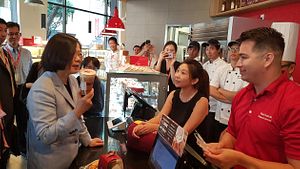Earlier this week, Taiwan’s President Tsai Ing-wen made a high-profile stopover in the United States. As The Diplomat predicted, Tsai’s latest “breakthrough” in diplomacy led to retribution from Beijing. Unexpectedly, however, Beijing’s revenge started nearly immediately, and started by targeting a private, Taiwan-based bakery-cafe chain, 85C Cafe.
85C Cafe, owned by Gourmet Master Co. (a Taiwan-based company), operates in worldwide markets, including mainland China, Taiwan, Hong Kong, the United States, and Australia.
On August 12, during her stopover in Los Angeles, Tsai stopped by an 85C Cafe location, where she reportedly received a custom gift bag with her name printed on it. (It was later clarified by 85C Cafe that Tsai didn’t receive any gift but autographed a pillow for one of the staff members.) Photos showing President Tsai being warmly welcomed by 85C Cafe’s Taiwanese staff were widely circulated online.
Surprisingly, Tsai’s simple stop-by triggered serious backlash in mainland China.
Several Chinese nationalistic media outlets reported about Tsai’s stop at the chain, accusing 85C Cafe of “supporting Tsai Ing-wen and Taiwan’s independence” with highly inflammatory rhetoric. The Global Times, a state-run newspaper that is infamous for coining distorted information to incite nationalism, was again one of the most active agitators this time. This newspaper published a series of reports claiming that 85C Cafe — “such a Taiwanese company which is making big money in mainland China” — supports Tsai’s policy of pro-independence of Taiwan. Some Chinese mainlanders also noticed that 85C Cafe’s official website categorized its China branch under its overseas operations — a lethal mistake in the eyes of Chinese nationalists.
According to Gourmet Master’s 2017 annual report, the revenue generated from mainland China amounted to 64 percent of 85C Cafe’s total by 2017. In comparison, Taiwan, the company’s home base, and the United States each generated only 17 percent of the total revenue.
Faced with this urgent PR crisis, 85C Cafe immediately published an announcement on its Chinese website on August 15, emphasizing that the company “has never changed its position of upholding the 1992 Consensus ( or One China Consensus).”
The company will “keep contributing to the peaceful development of cross-strait relations and opposing any behavior and words that split cross-strait compatriots,” the announcement said.
However, this announcement failed to resolve the crisis. The Global Times, together with other outlets, intensified its attacks on 85C Cafe. Those reports claimed that the company’s belated response is just a mean to ease criticism, because the announcement was not published on either its Taiwan website or its Facebook page.
To make matters worse, several of China’s most popular platforms that offer online food delivery service, including ELEME Inc., Meituan, and Dianping, have deleted 85C Cafe from their apps. This collective move — against the logic of the market — implied that authorities in Beijing are likely standing behind the anti-85C Cafe campaign, although Beijing so far hasn’t publicly expressed its attitude on the incident.
This is not the first time that overseas brands have suffered in China due to decisions by political leaders. When China and South Korea were locked in a dispute over the deployment of the U.S. THAAD missile defense system, South Korean brands also suffered a lot in China.
For example, some Chinese nationals launched boycotts against Lotte Group (a South Korean multinational conglomerate) because that company agreed to provide land in South Korea to deploy the THAAD system. Although the Chinese central government repeatedly denied any direct involvement in the boycotts at that time, Lotte Mart also become the target of governmental regulations.

































